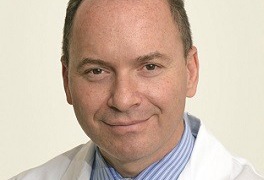
Industry players and device makers have helped spark new science and innovation in vascular surgery amid flatlining National Institutes of Health (NIH) funding, but physicians must pay heed to the conflicting agendas in the partnerships formed with these companies, a focus session on ethical issues in practice at the 2022 annual symposium of the Society for Clinical Vascular Surgery (SCVS) in Las Vegas (March 19–23) heard.
“Industry sponsors a huge amount of significant research and NIH funding has been stable for a long time,” Alik Farber, MD, chief of vascular and endovascular surgery at Boston Medical Center, Boston, told the SCVS 2022 gathering. “Given NIH funding that is limited, and given the pay lines that have been decreased recently, industry-sponsored research adds new science and innovation. I’m sure industry leadership when they plan their trials, try to do everything they can to make useful clinical trials to try to help physicians and patients. But [industry’s] clear primary fiduciary duty is to get their devices through the regulatory process to market, sell them and optimize profits.”
It is therefore incumbent upon surgeons participating in industry-sponsored trials and partnerships to “understand the conflicting agendas” and be transparent about them, he said. The comments came as Farber delivered a presentation entitled, “Are we too cozy with industry?”
Farber used signposts from his own career to demonstrate how industry had aided certain aspects of his own trajectory, such as the beginning of his endovascular practice in which an industry representative provided him with the devices he needed, as well as the BEST-CLI (Best endovascular versus best surgical therapy in patients with critical limb ischemia), of which he is a principal investigator. “BEST-CLI ran out of money,” he explained. “We approached societies and everybody gave—including the SCVS—but we also approached industry. Initially, we did not want industry involved at all but we had no choice, facing a disaster, and they helped us.”
Yet, the two-way relationship is much more problematic than benefits to care, Farber continued. There are incentives on both sides, he said, but those are not necessarily aligned.
Farber referenced a study carried out at his institution that sought to capture a snapshot of the financial relationships between academic vascular surgeons and industry. They found that in 2017, $8.5 million went to 997 academic vascular surgeons—86% of those captured under the academic vascular surgeon designation. Some 115 of that number accounted for $7 million of the total figure, he noted. “We concluded that most academic vascular surgeons have received payments from industry,” Farber told SCVS 2022. “The top decile of surgeons received more than 80% of the transactions.”
To balance these relationships and ensure they are lawful, “we should accept the fact we have our own agendas” he added, and that “we are not exempt from the influences of human nature,” meaning that “gifts have an effect.” Be aware of laws and rules in the jurisdictions in which practice, Farber emphasized.
Importantly, he said: “We should not allow our relationships to influence how we choose to treat patients. I could repeat that 10 times. This is critical.” Returning to his initial question, Farber asked once more: “Are we too cozy with industry? I think as a specialty we’re not, but I think individually we need to look at ourselves in the mirror and figure it out.”












